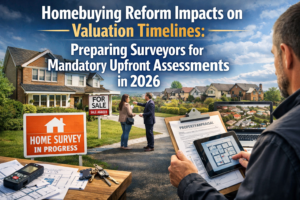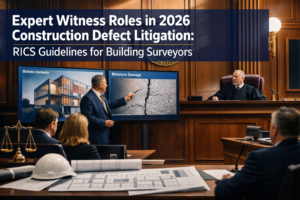
Property Surveys in Manchester
Property Surveys in Manchester, London, Bristol, Birmingham & Cardiff
When buying property in Manchester, you must consider the value of a residential survey. Be it a house, flat, or commercial space, a building that you are about to purchase should be inspected by a qualified professional.
The same goes for extending the lease of a property that you live in. Buildings in Manchester (and the Midlands more generally) have an incredibly rich history, and our diverse property market means that understanding your potential investment in detail is absolutely essential if you’re to make a truly informed decision. What do you get for your money?
A typical property inspection that you commission will assess the structure of the building, be it residential or commercial, and pinpoint what defects and coverings need to be addressed for the building to maintain its reliability and value.
Surveyors with Experience Located in Manchester
This guide provides information about property surveys in the Manchester area. It discusses the essential role of RICS chartered surveyors, the types of surveys they carry out, and the unique features of the Manchester property market. It also looks in detail at the 10 properties they surveyed, discussing their findings and the 10 potential problems they uncovered.
Manchester’s property market is vast and varied, with every imaginable type of property, from modern to retrofit builds. Whatever style or era you’re looking for, you’ll be able to find it, and you’ll need a survey for most types of property you consider.
A building survey is often conducted by a member of an institution, such as the Royal Institution of Chartered Surveyors (RICS) or Chartered Institute of Building (CIOB) or Residential Property Surveyors Association (RPSA), to which one would be proud to belong. Thus, it is certainly commendable for the surveyor whom you choose to bestow upon you a building survey to have membership in one of these institutions. After all, you wouldn’t want just anyone to conduct the survey.
Property Survey Types
The property you want to buy, its age, and whether or not you’re getting a mortgage will determine which kind of property survey is required. For example, a RICS Level 3 survey is much more appropriate for older buildings and provides a detailed account of the building’s condition.
In reading the report, one can easily grasp the problems and appreciate the estimated costs for repairs. When looking at properties in Manchester, it is important to decide on the kind of report that will be most useful to you. You have the option to choose from a Level 1 (very basic condition report), Homebuyer Report (Level 2), a valuation report, or a full building survey (Level 3). You can also select from other types of reports, such as a specific defect report or a roof survey.
Is a Property Survey Necessary?
You significantly raise the danger of defects leading to a loss when you don’t get a property survey. Defects with walls, joists, or rafters—basic structural elements of a property—can potentially lead to huge bills for that property once it becomes yours.
Costs at the rectification stage can sometimes be almost as high as the property purchase price itself. Using a chartered Building Surveyor to critique the property you are considering buying allows your prospective purchase to be informed.
What is the price of a property survey?
A property survey can range in cost from a few hundred to several thousand pounds, depending largely on the amount of investigation that has to be done. For most properties built within the last couple of decades, a simple Homebuyers report is sufficient. If the property is larger, older, or more expensive, however, then a full building survey is probably your best choice.
What Advantages Does a Property Survey Offer?
Employing the services of a Manchester-based chartered surveyor can make savings in your property investment. If you are looking to purchase, invest in, or remortgage a residential or commercial property in the Manchester area, the onus is on you to ensure that you are making the right decision.
A property survey is almost certainly a requirement for a mortgage, but the mortgage lender typically only carries out a valuation, whereas you ought to commission a building survey. Surveys are relatively low-cost insurance policies against the horrors of subsidence or other potentially life-threatening structural issues.
Detecting Defects: Some may be small and easy to remedy; others could affect the value of the property enough to justify negotiating with the seller to lower the price or reconsidering whether you want to buy the property at all.
Plan for the Future: If you’re moving into an old or new property, knowing its condition and any associated problems can help you plan for the years ahead.
Contractor Quotations: when your surveyor identifies problems with a property, it can help you identify what exactly needs remedying before going to contractors.
Role of RICS Chartered Surveyors in Manchester, London, Bristol, Birmingham & Cardiff
The RICS is one of the governing bodies for the property surveying industry, albeit a private one—it is not an agency of the government. An RICS-qualified professional, known as a “Chartered Surveyor,” gives expert advice on a range of property-related issues. RICS-registered valuers and surveyors adhere to strict protocols and provide a high-calibre service to their clientele. In Manchester, the property surveying industry is led by Chartered Surveyors who also cover all manner of surveying services for residential and commercial buildings.
Property Survey Cost
Any property survey will usually be based on the size, location, and value of the property. The additional cost of getting a full building survey instead of a basic property survey is often worth it, as it can catch potentially expensive long-term problems.
Homebuyers reports: these are a typical choice for properties in Manchester. They usually cost around £700. They are not the most comprehensive of inspections, but they tend to do well at identifying any significant problems with a property. Most people would be quite put out if a house they were thinking of buying turned out to have a case of the damp.
Full Building Survey: this type of survey is generally priced from £800; however, costs can rise significantly depending on the size and location of the property as well as its overall value. These reports detail any current structural issues and pinpoint repairs that may run into the many thousands of pounds. If you’re considering an older or a particularly expensive piece of real estate, it’s worth your while to pay for this report because it will alert you to significant issues the property may possess.
Valuation: estimating the property value helps you and others to understand its worth when you come to sell it. For our purposes, it is most helpful to think of valuation as divided up into two sections: determining market value and estimating rebuild costs. The former concerns how much the property would sell for on the open market, whereas the latter is to do with how much it costs to rebuild the property in the event of it being destroyed.
Rebuild cost estimating is an important part of the service tied to a mortgage because the provider wants to know that if something terrible were to happen there would still be sufficient funds available to cover the cost of the reconstruction (like a fire, which is life-threatening and catastrophic to the property).
Specific Defect Report: when a particular issue with a property—like subsidence or dampness—needs more investigation than the building survey or mortgage valuation could provide, then a specific defect report is required. If a structural engineer is called in to look at something really worrisome, this is how much it will cost on average: anywhere from £400 to £1500 at the high end.
Roof survey: certain roof or aerial evaluations may cost significantly less than full-scale building assessments. If the building assessment or mortgage valuation brought to light any potential issues with the roof, then further investigation is warranted. From a cost standpoint, re-roofing could be a disastrous hit to your personal finances, so getting a clear understanding of the roof’s condition can save you from that fate. You can get a standard assessment by sending someone up onto the roof, by using a pole camera, or by employing a drone. The average cost of a roof assessment is around £600.
Comparative Analysis: Homebuyer Report vs. Full Building Survey
A homebuyer’s report is like a short visual inspection of a house. It is relatively quick; it shows only what is significantly wrong (if anything) with a property. It doesn’t take too long to read; it has relatively few pages. Out of all National House Condition Surveys, the Homebuyer Report is the most common. It is recommended only for use with properties that are either fairly new or that conform to conventional construction standards.
When one inspects a house at the level of the homebuyer’s report, the surveyor is really doing not much more than a visual examination. To go further into the kind of inspection that the homebuyer report represents is to lapse into what a builder might do about a house’s condition.
Conversely, a building survey is much more thorough and seen as a true reflection of a property’s condition. Targeted at larger, pricier, older, or nonstandard-construction properties, the building survey’s in-depth analysis considers the implications of the identified defects (sometimes hidden) and problems likely to develop because of those defects. The building survey format allows for a useful reading on the conditions of the property that go beyond what a “standard defect” can tell you. By prompting the reader to consider the kinds of things that a team of property condition assessors would look at, the survey allows you to visualize the property in a way that encourages you to think about the usefulness of the information it presents.
Manchester Level 2 Homebuyer Reports
The RICS Homebuyer report is one of the most commonly accepted surveys on which many potential buyers of domestic properties base their purchase decisions. The RICS Homebuyer report uses a traffic light system to evaluate the condition of the property. It denotes good condition with green, and orange denotes that the area may need attention in the future and that it is not in urgent condition. Red signals that there needs to be investigation into the area and that it is in need of immediate and urgent repair.
The Homebuyers report is not as thorough as a Full Building Survey at Level 3 but is still a valuable tool for any Homebuyer. The report also goes into detail about the types of problems, if any, that the property may have; the potential consequences of these problems; and the likelihood of them occurring if they haven’t developed yet. The potential for faults, failures, and other consequences is described fully but at a level suited to the public.
Level 3 Building Survey in Manchester
This is the most thorough report and typically takes a number of days to put together. However, it yields a comprehensive look at the property. It costs slightly more than a Homebuyer Report but might save you a lot more in the long run by identifying issues that would otherwise become very costly.
The report examines possible movement/subsidence, timber defects (such as rot), dampness, condensation, utility services (gas, hot water, heating, and electricity), and the actual structure of the building (roof, chimneys, and frame).
The principal advantage of the full building survey is that it provides a comprehensive overview of the property being considered. The survey can help the prospective buyer make an informed decision about whether to go ahead with the purchase, based on the condition of the property, which includes the presence (or absence) of any significant defects that are not readily apparent and might be uncovered in a visual inspection. For instance, some part of the survey might reveal the need for certain purely cosmetic improvements, while other parts might point to some significant structural issues that will require a huge financial outlay—in some cases, potentially life-threatening problems that will need to be fixed—that the prospective buyer could be saddled with.

Surveys of Commercial Property
If you’re thinking of acquiring, leasing, subletting, disposing of, or altering commercial premises in Manchester, you would be well advised to locate a surveyor skilled in the nuances of commercial building surveying – should you spot a defect in a commercial building you can use that information to negotiate an asking price for the property that’s considerably lower than what the seller originally wanted, or you can talk your way out of a bad deal altogether.
Our Manchester-based team of RICS-compliant commercial building surveyors is equipped to handle matters throughout Manchester.
Contact
Our team prioritizes client care above all else. We look forward to being in touch with you so you can instruct a surveyor in Manchester, London, Bristol, Birmingham or Cardiff. You can reach out to us easily. Just fill out our form, and we’ll get back to you with a free quote for your survey. All our surveyors are qualified as members of the Royal Institution of Chartered Surveyors (RICS) and we are one of the UK’s leading providers of building survey and valuation services:
- Accredited Professionals: Certified by organizations like RICS, CIOB, and RPSA.
- Customized Survey Reports: inspections to meet your specific requirements.
- Local Expertise: Deep understanding and specialized knowledge.
- Expert Guidance: Professional recommendations and support.
The property survey you commission will be carried out by an accredited professional. Your chartered surveyor will be a member of the Royal Institution of Chartered Surveyors (RICS) or the Chartered Institute of Building (CIOB), or will belong to some other industry-standard professional body. Rest assured; you will receive highest quality of professional service for your survey.

















